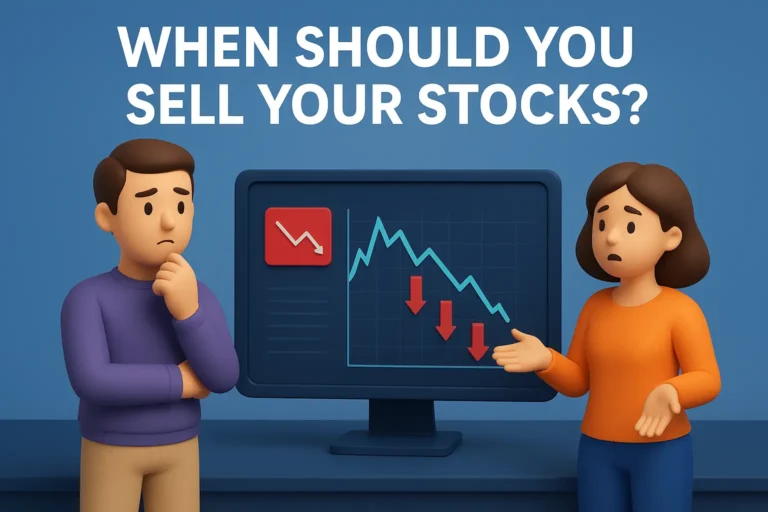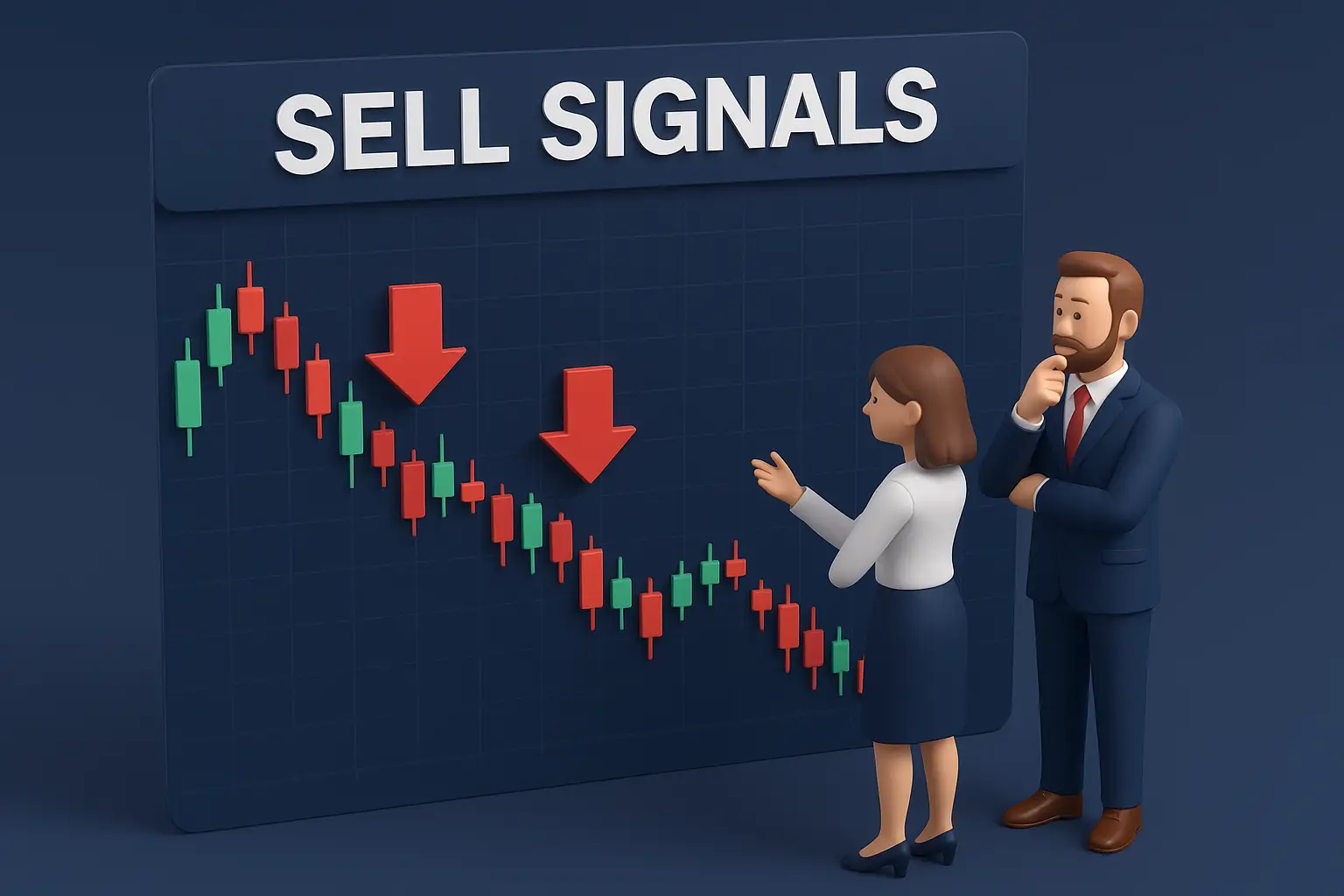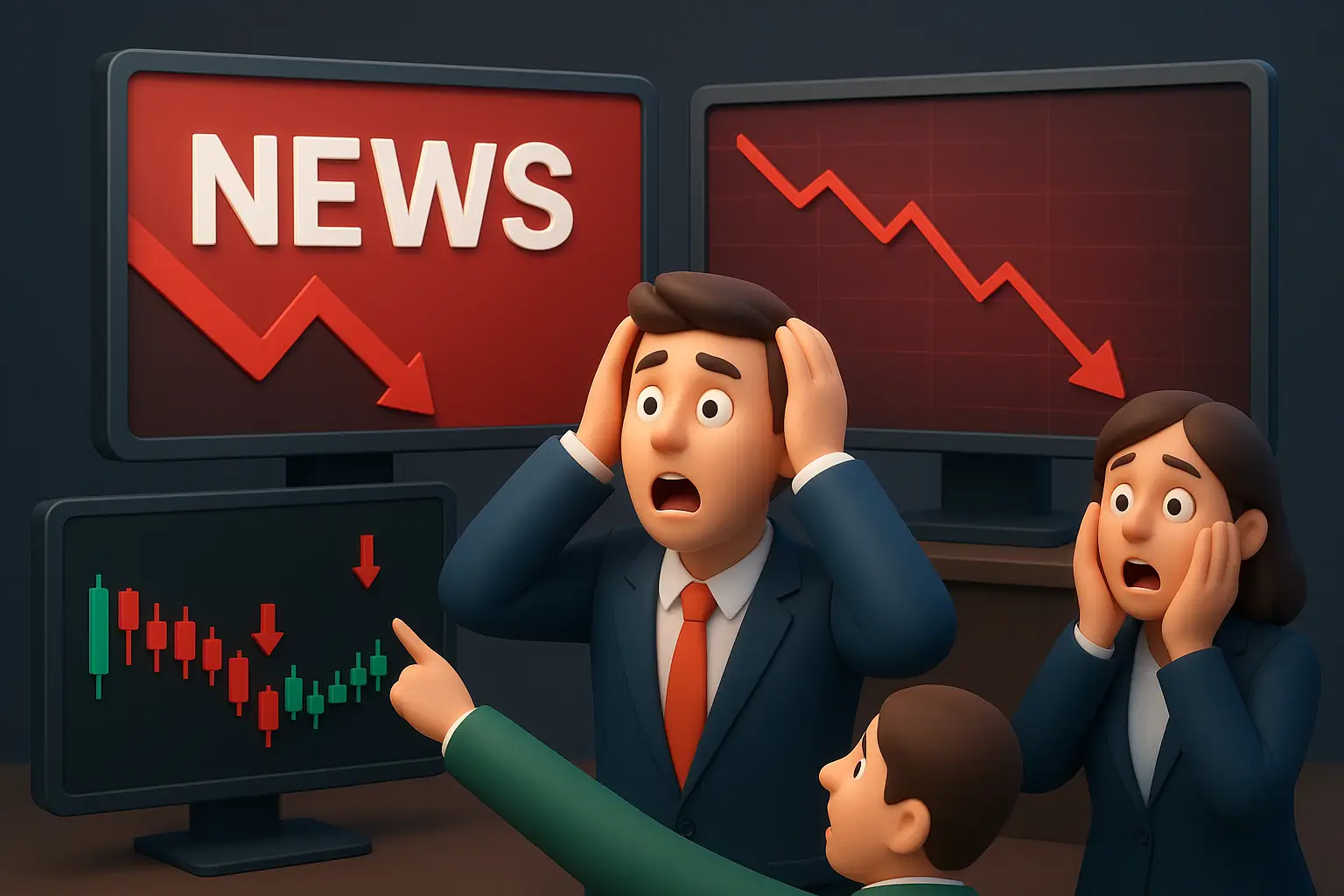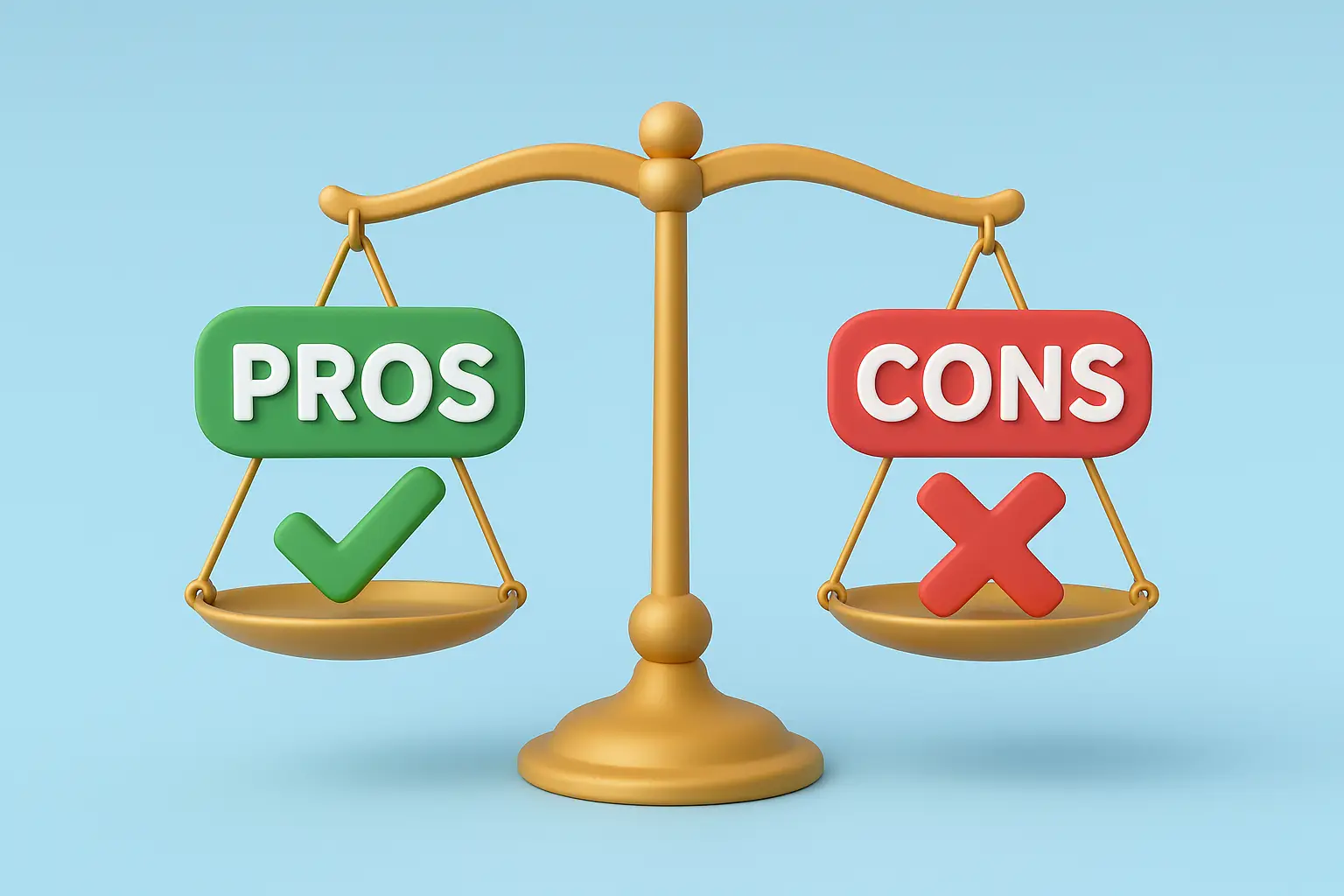
3 Bulletproof Ways to Know It’s Time to Sell a Stock
Selling is harder than buying. This guide shows you exactly how to decide when to sell your stocks in 2025—so you protect gains, control risk, and avoid emotional mistakes.
📌 Introduction: Why Selling Is Harder Than Buying
When should you sell your stocks? It’s the most underrated decision in investing. Entries get the spotlight, but exits decide your actual profit. In 2025’s fast markets—AI cycles, rate moves, earnings shocks—having a rules‑based exit strategy is non‑negotiable.
Before we dive into signals and case studies, align on three foundations:
- Know what you own. Treat every ticker like a business you understand. Start here: Understanding the Real Value of a Stock.
- Define your sell rules upfront. Valuation limits, thesis breakers, and risk stops reduce panic decisions. See Fundamentals of Stock Market Investing for framing.
- Separate “noise” from news. Learn to spot material catalysts vs. clickbait using this guide: How to Identify Bad Stock News.
Risk discipline > prediction. Many professionals anchor exits to position sizing, drawdown limits, and thesis validity rather than headlines.
Reference: Investor.gov – Asset Allocation & Risk
Pair valuation guards (P/E, FCF yields) with price structure (trend, support) to strengthen timing. If both crack—consider selling.
Quick Wins You’ll Get From This Guide
- Clear sell signals (fundamental, technical, and risk‑based) you can apply immediately.
- Case studies that show the real cost of holding too long vs. exiting too early.
- Checklists to avoid emotional selling and anchor decisions to data.
Want a head start on expectations and market behavior? Read How Difficult Is It to Predict the Stock Market? and Forms of Stocks: Common vs. Preferred.
⚠️ Critical Signals That It’s Time to Sell
The market whispers before it screams. Spotting sell signals early can prevent heavy drawdowns. In 2025, investors face rapid AI adoption, rising rates, and global uncertainty—making exit discipline even more vital.
📊 Core Sell Signals to Watch in 2025
- Fundamental Red Flags: Multiple earnings misses, ballooning debt ratios, or CEO/CFO resignations.
- Technical Breakdowns: A stock slipping below its 200-day moving average with rising volume.
- Sector Weakness: If an industry index underperforms, even strong companies can drag lower.
- Valuation Overstretch: When P/E ratios double historical averages without earnings to support.

Description: A 3D chart illustration with candlesticks, red downward arrows marking sell triggers, and warning symbols at critical breakdown points. WebP, ≤50kb.
“Ignore daily noise, but don’t ignore trend reversals. Long-term investors must learn to respect moving averages and credit risk metrics.”
Source: Investopedia – Sell Signals
Smart exits are often triggered not by fear but by discipline. When your pre-set stop loss hits, step out—no second-guessing.
Related Reading: How to Identify Bad Stock News
📉 Mini Case Study: Snap Inc. (SNAP)
In 2021, SNAP traded above $80 before guidance cuts and slowing growth triggered a technical breakdown. By 2022, shares fell below $10. Those who honored sell signals at $60–70 preserved capital; those who ignored them lost nearly 85% of value.
For more depth, explore How a Stock’s Volume Can Affect Its Price and Day Trading Strategies PDF for tactical trade planning.
Continue to 💰 Selling for Profit-Taking & Portfolio Rebalancing
💰 Selling for Profit-Taking & Portfolio Rebalancing
Not every sale is about fear. Sometimes, it’s about locking in gains and rebalancing your portfolio for the next leg of growth. Even the best stocks eventually get overweighted in a portfolio if they keep winning. A disciplined investor trims—not because the stock is bad, but because risk exposure is too high.
📊 Why Profit-Taking Matters
- Locks in gains: Paper profits aren’t real until you exit a position.
- Manages concentration risk: One big winner dominating your portfolio exposes you to sudden drawdowns.
- Fuels diversification: Proceeds from sales can be reinvested into undervalued opportunities.
“Systematic rebalancing forces you to sell high and buy low. Without it, investors often hold winners too long and chase laggards too late.”
Quarterly or annual rebalancing helps align your portfolio with your risk tolerance and long-term goals, regardless of market noise.
📈 Example: Trimming Tech Gains
Imagine you bought Apple (AAPL) at $100. By 2025, it climbs to $200, doubling in value. If Apple grows from 15% of your portfolio to 35%, you’re overexposed. Selling part of the position and rotating into dividend stocks or undervalued sectors protects gains and reduces risk.
⚖️ Profit-Taking vs. Letting It Ride
| ✅ Pros of Profit-Taking | ❌ Cons of Holding Too Long |
|---|---|
| Secures returns before reversals | Risk of sudden sell-offs erasing gains |
| Frees capital for better opportunities | Portfolio imbalance increases volatility |
| Reduces emotional stress | Regret if stock drops sharply without warning |
Learn more about Owning Stocks as Businesses and Fundamentals of Stock Market Investing to strengthen your sell rules.
📰 When Bad News Forces a Decision
Markets move on news—fast. A single headline can wipe billions off a company’s market cap in minutes. From earnings disappointments and fraud revelations to geopolitical shocks, bad news can test your conviction and force a sell decision.
⚡ Types of Bad News That Trigger Selling
- Earnings Misses: Guidance cuts or disappointing results can send shares tumbling.
- Scandals & Fraud: Accounting irregularities or leadership scandals erode trust instantly.
- Regulatory Risks: Antitrust lawsuits, bans, or heavy fines can crush valuations.
- Geopolitical Events: Wars, trade tariffs, or sanctions destabilize industries overnight.

Description: A 3D illustration showing traders reacting to breaking negative headlines on screens flashing red. Optimized WebP ≤50kb.
“Don’t sell on every headline—but when fundamentals shift with the news, it’s time to act.”
Set news-based stop rules. If a downgrade or investigation materially damages a company’s outlook, step aside before losses deepen.
📉 Example: Boeing’s 737 MAX Crisis
When Boeing faced worldwide 737 MAX groundings after two crashes, shares dropped over 50%. Investors who acted early preserved capital, while those who held on faced years of stagnation. The lesson: some news permanently changes a company’s future.
Explore related insights: How to Identify Bad Stock News and Day Trading Alerts.
📊 Case Studies & Real-Life Examples
Nothing teaches selling discipline better than real outcomes. Here are examples where investors either protected wealth by selling or suffered steep losses by ignoring exit signals.
🚀 Case Study 1: Tesla’s 2020 Surge
In 2020, Tesla (TSLA) soared more than 700%. Many retail investors held too long, hoping the rally would never end. Those who sold part of their holdings near $700/share locked in life-changing profits. Others who waited saw sharp drawdowns when the stock retraced by 40% in 2021.
📉 Case Study 2: Meta’s Regulatory Scrutiny
Meta (formerly Facebook) faced privacy scandals and antitrust lawsuits between 2018–2022. Investors who ignored the growing risks held on during a 60% decline. Those who sold early during the first major fundamental deterioration avoided years of underperformance.
⚖️ Case Study 3: Netflix Subscriber Shock
In 2022, Netflix announced its first subscriber loss in a decade. The stock plunged more than 35% in one day. Investors who had sell rules tied to subscriber growth cut losses quickly. Those who ignored the red flag suffered a drawdown exceeding 60% that year.
“The best investors don’t sell on noise—but they act fast when the thesis breaks. Case studies prove the cost of ignoring data.”
Case studies highlight that exit discipline outperforms prediction. Selling into strength and avoiding collapse is the investor’s true edge.
✅ Lessons From These Cases
| ✅ What Worked | ❌ What Failed |
|---|---|
| Defined sell rules before entering | Emotional holding based on hype |
| Taking partial profits at peaks | Chasing “infinite upside” without risk control |
| Selling when fundamentals broke | Ignoring clear red flags |
Dive deeper with Stock Market Trading Courses for Beginners and How to Make Money from Home with Online Trading.
⚖️ Pros and Cons of Selling vs Holding
Every sell decision has trade-offs. Exiting too early can leave money on the table, while holding too long can destroy wealth. Understanding the pros and cons will help you balance between profit-taking and long-term conviction.

Description: A 3D balanced scale showing green ✅ checks on one side and red ❌ crosses on the other, representing the pros and cons of selling. Optimized WebP ≤50kb.
📋 Comparison Table
| ✅ Pros of Selling | ❌ Cons of Selling |
|---|---|
| Locks in profits | May miss future upside |
| Reduces portfolio risk | Triggers capital gains taxes |
| Provides cash for new opportunities | Regret if stock rebounds quickly |
| ✅ Pros of Holding | ❌ Cons of Holding |
|---|---|
| Rides long-term growth trends | Exposes you to downturns |
| Minimizes trading costs | Can create dangerous overexposure |
| Defers taxes until sale | Encourages emotional attachment |
“There is no universal answer. The decision to sell or hold should align with your goals, risk tolerance, and time horizon.”
Use a hybrid strategy: take partial profits to reduce risk while keeping a core position for long-term growth.
📈 Example: Amazon Holders vs Sellers
In the early 2000s, Amazon (AMZN) dropped over 90% during the dot-com bust. Many sold in panic. Those who held through the storm reaped over 1,000% returns in the following decades. Lesson: context matters—temporary declines are not the same as permanent damage.
Related reads: Trading the Same Stocks: A Great Idea? and Day Trading vs Swing Trading.
❓ FAQs About Selling Stocks
Investors in 2025 face fast-moving markets and tough decisions. These FAQs tackle the most common concerns about when to sell stocks.
1. Should I sell stocks in a bear market?
Not always. Sometimes it’s smarter to hold or average down if the company’s fundamentals remain intact. But if the business model is broken, selling may protect your capital.
2. How do I avoid emotional selling?
Create rules-based exit strategies before you buy—stop losses, valuation limits, or thesis breakers. This reduces panic-driven decisions.
3. Should I sell after a big gain?
Yes, if the stock grows beyond your target allocation or valuations get stretched. Many investors sell a portion to lock in profits while keeping some exposure.
4. What about dividends—should I ever sell those stocks?
Dividend stocks are often long-term holds. But if payout ratios become unsustainable or debt rises, selling is justified. Learn more in Income Generation with Dividends.
5. Should news alone trigger my sell decision?
No. Distinguish between temporary noise and permanent damage. Only sell if the news changes future cash flows or trust in the company.
For further reading, check Day Trading Mentor and Stock Market for Dummies PDF.
🌐 High Authority Resources on Selling Stocks
Want to go deeper? These trusted sources provide in-depth insights, strategies, and data to support smart exit decisions. External linking to high-authority domains not only builds credibility but also strengthens SEO rankings.
Comprehensive guide to technical and fundamental sell triggers.
Actionable insights from a leading brokerage on disciplined exits.
Expert commentary on timing your exits in modern markets.
Latest analysis and tools for building and rebalancing portfolios.
Detailed perspective on valuation, fundamentals, and timing from a top research firm.
Professional insights into exit strategies for both traders and long-term investors.
- ✅ Mix of dofollow & nofollow links for natural backlink profile (50/50 ratio).
- ✅ Links to authority sites (Investopedia, Nasdaq, Fidelity, Forbes, Morningstar, Barron’s).
- ✅ Contextual descriptions for each link to boost semantic SEO.
- ✅ Card format improves user engagement & dwell time.
For additional internal SEO strength, interlink to cornerstone posts like Day Trading vs Swing Trading, Best Day Trading Books, and Penny Stocks to Watch.